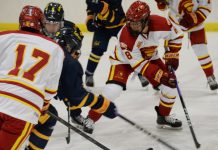
MANCHESTER, N.H. — Minnesota-Duluth could not have come much closer to its fifth trip to the Frozen Four.
The Bulldogs came into their contest with Boston University a decided underdog in many observers’ eyes. While they were a respected No.2 seed, and BU the regional’s top seed, the gap between the two appeared larger than that.
[scg_html_ne2015]BU had been in the top three or four in the national rankings for most of the season, won the Hockey East regular season title and then added the league’s tournament championship.
By contrast, Duluth enjoyed the benefits and stature of being part of the NCHC, college hockey’s clearly dominant conference this season, but had finished fifth of eight teams in the league and got bounced by Denver 4-3 and 4-0 in the opening round of the tournament.
While BU boasted the No. 1 offense in the country, Duluth ranked 23rd in offense and 25th in defense.
BU clearly had the star power. Jack Eichel, college hockey’s top scorer, had accumulated only one fewer point than the three members of Duluth’s top line combined. The Bulldogs, in fact, were one of the few teams to enter the tournament without a single 30-point producer.
Props were due Duluth for emerging from the toughest conference and then thoroughly throttling cross-state rival Minnesota in the first game. Clearly, this was a team that had earned its seeding.
But the favorite remained Boston University.
The Terriers jumped out to a 1-0 first period lead, but Duluth tied it in the opening minute of the second, and by period’s end it was 2-2.
Anybody’s game.
“That was a playoff game in every sense of the word,” BU coach David Quinn said afterward. “It was like a heavyweight fight. We controlled the first few rounds, almost had a couple opportunities to deliver a knockout punch, but they’d come back and dominate for 10 or 12 minutes. Then we’d come back and dominate for 10 or 12 minutes.
“Then we did what we do best. We played a great third period. We were relentless. We were smart. We did the things we needed to do to win an incredibly important hockey game.”
Understandably, Duluth saw the third period differently. The Bulldogs’ focus fell squarely on the holding penalty called with less than five minutes left in regulation.
Some will say it looked like a penalty.
But.
The resulting power play for BU was only the second such advantage for either team all game.
The Bulldogs had to be thinking, not now!
To their credit, they killed almost the entire penalty.
Almost.
The saddest word in playoff hockey.
Evan Rodrigues scored the game-winner on a slick toe drag with one second remaining on the power play.
One second.
And although the Bulldogs mounted ferocious pressure in the final minute with their goaltender pulled, even requiring video replay to determine that somehow they hadn’t gotten the puck across the line, they couldn’t get the equalizer. The Terriers had a 3-2 victory.
So close, but yet so far.
“We could have had a couple bounces, but that’s how hockey is,” Alex Iafallo said. “You’ve got to respect [BU], but it’s a tough one to swallow.
“It stings. It’s not how you want the season to end. You don’t expect that to happen.”
Without using the word “penalty,” Duluth coach Scott Sandelin said what his team was thinking.
“It was a great hockey game,” he said. “It’s unfortunate the way it ended. I’ll leave it at that.
“What can you say? They made a play at the end of the power play to win the hockey game. They’re moving on and we’re not.”
When pressed, he added, “It’s just unfortunate that it had to end like … that.
“For all the great chances they had, I would have liked to see it continue, just let the kids play and decide the game.”
Those wishes didn’t come true.
And words by BU’s coach rang true and bitter at the same time.
“There’s a small margin of error in every hockey game,” Quinn said, “and that margin gets smaller and smaller the later you play.”


